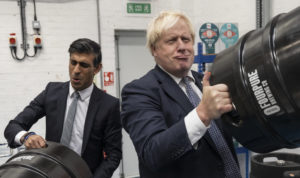Have things ever been so grim? Given the depressing reality of contemporary Britain — with the endless stories of sleaze and decay, decline and division — it is easy to draw that conclusion. Surely the NHS has never been this dire, the union this fragile or the country’s economic prospects this bleak? Surely we’ve never had a government, or a parliament, quite so devoid of ideas and ambition? For those, like me, who find themselves asking these questions more regularly than ever, there is a salve of sorts available: modern British history. If you think you’re living through the worst of times today, think again — it’s usually like this.
Over the past few months, researching a book on Britain’s long, troubled relationship with Europe, I have found a strange solace in the almost seasonal nature of our national life, with its endless wintery crises (usually involving the weakness of the pound and our ability to pay our way) that eventually give way to spring-like calms. Ben Pimlott’s biography of Harold Wilson, for example, is like a thunderstorm of charm and disorder, short fixes and political escapism. There was, of course, plenty of honour and achievement along the way, but as you turn the final page, you cannot help but wonder what it all amounted to. Here was a magical politician who dominated British politics for more than a decade, only to fade from national consciousness with alarming speed, his ghost barely even troubling the minds of his successors let alone haunting them. Today, Wilson is back in vogue as the man who finally ended 13 years of Tory rule, a favourite of Keir Starmer and some Sixties nostalgics, but this was a man almost broken by his own decline — and his country’s.
Wilson, though, is the rule in this regard, not the exception. A similar air of despondency hangs over almost all of Britain’s post war leaders up until 1979, each of whom fixated on the notion of British decline but were unable to escape its clutches.
And yet, here is the strange reality: despite it all, the country continued its slow, steady trudge over the fells, never veering much from the path it had been on before, the economy growing at much the same rate, only more slowly with each passing decade. Britain’s decline was largely relative, the living standards of people in Britain improving year on year.
Anyone scanning the record of British economic growth from 1949 to 2022 would be hard-pressed to spot any transformative moment. From our entry into the Common Market in 1973 to the election of Margaret Thatcher in 1979, or, indeed, the referendum to leave the EU in 2016, we continued plodding along largely as before, however transformative we convinced ourselves one set of leaders or another was at the time. To the casual observer, it is the recessions which catch the eye more than the booms, most of which blew in from abroad, largely beyond the control of our leaders, the pandemic just the latest example. For Britain, the truth is that our crises are never quite as important as we imagine — and nor are our leaders.
To illustrate the point, here’s a challenge: when was the last time a British government or prime minister pro-actively achieved something of lasting importance, addressing some great strategic threat before it became an existential challenge? The disasters are far easier to list, but not the lasting achievements. Did any of Gordon Brown, David Cameron, Theresa May, Boris Johnson or Liz Truss leave us with any lasting monument to progress? It is hard to think of one. They largely managed crises — or, more often, caused them.
Johnson took Britain out of the European Union, of course, but that hardly passes the test. The best that can be said for his Brexit negotiation is that it acted as a kind of emergency stent, unblocking the arteries of British democracy at a time when they had become fatally obstructed by the political failure to enact the result of the referendum. In itself this was no small thing, perhaps even a service to democracy, but it was an operation to deal with an emergency health crisis — not to stop one from happening in the first place. It also came at the obvious cost of creating a whole series of other crises that we are still living with today. Besides this, what else does Johnson have to show for his time in office that would not have happened without him? Ukraine has benefited from his instinctive, full-throated and continuing support, but let’s be honest, it is not British support which makes the difference in the Donbas — but American.
Johnson’s one strategic offer was his promise to use Brexit as a spur for a great national reset: “levelling up”. But what has happened since? Less than a year after he left office this policy already seems dead. Again, though, Johnson’s failure is not exceptional. In politics, turning the tide is almost impossible. Anthony Eden tried to protect Britain’s global status from the post-war reality only to reveal its decline at Suez; Harold Macmillan attempted something similar by trying to join Europe, only to be rejected by de Gaulle. Wilson’s grand plan to revolutionise the British economy with planning and science was then mugged by reality, while Ted Heath’s great corporatist alternative was similarly ended by events. All failed.
Even Margaret Thatcher, who is widely thought to have succeeded in her mission to radically reform Britain, is flattered by the narrative. A quick glance at Britain’s economic growth before and after she became prime minister suggests a far less revolutionary reality than we often imagine. Overall, Mrs Thatcher spent 11 years in power, her time defined by a period of decent but by no means extraordinary growth bookended by two deep recessions. In reality, her great success was relative. Britain grew faster than its European counterparts during her time in office, which had not been the case beforehand.
Today it is hard to look back at the premierships of those who came next and think of a single lasting endowment. Perhaps Cameron can put gay marriage on his ledger, but once again, it is hard to believe that had he not existed, gay marriage would be illegal today. As brave and principled as it was, the reform was largely a reflection of the great social change happening across the Western world. The banal truth is that our prime ministers spend most of their time surfing the zeitgeist, not making it.
I remember challenging Boris Johnson about this very point after travelling with him to Northern Ireland a couple of years ago. He’d told me he was reading James Shapiro’s 1599: A Year In The Life Of William Shakespeare (I later realised this must have been research for his biography). The book spends much of its early pages detailing the trouble Queen Elizabeth was facing that year in Ulster. And there we were, I thought, four centuries on, and the British prime minister travelling back and forward to Northern Ireland still unsure how to handle events there. “It’s very, very hard to change the fundamentals,” Johnson told me. Yet he was confident that he could. Quaint, really, and yet he is still trying to bend history to his will.
Blair is closest to Thatcher in leaving relics which continue to shape our world. And yet even his greatest legacies are now either crumbling or ambiguous. The Good Friday Agreement remains a source of almost mystic reverence — despite (or largely because of) the reality that few seem to know what it contains. But even this great covenant of peace is now barely functioning as a result of Brexit and the Northern Ireland Protocol (though the peace it helped bring about still holds). Devolution, meanwhile, that other lasting legacy of Blairite reform, has lost its halo, no longer the stabilising constitutional act it was once supposed to be, but something closer to the opposite. Regardless, however profoundly important these two achievements were — and are — they were only parts of a wider strategy to turn Britain into what he saw as a modern European state. And if we judge him on this score, he failed just like the rest of them.
When surveying our political past, then, it’s hard to avoid the sense of an undercurrent pulling us along slowly, whatever frothy chaos we endure on the surface. When we are outperforming our European counterparts, we mistake the swell for normality, only to sink back down in time. Then, when we are being outperformed, we fret about permanent submersion. Over the long term, though, we bob along, like Poohsticks in a stream, change happening to us more often than not.
All of this might seem reason enough for despondency. But in a sense, it is evidence for hope. Britain might be in a tough spot right now, but the current flows on. Prime Ministers are never quite as transformative as they seem — for good or bad. In Westminster, managerial normality is already reasserting itself after the years of Johnson. What many hoped would be a great reset in national political and economic life has proved anything but. There has been no revolution in the country’s social and economic model, no great reduction in migration, or taxation, regulation or trade — so far only the old system, but with worse trading conditions.
To my mind, Britain should fear less calamitous, irreversible decline than soul-sapping unchangeable continuity. Leaders are rarely successful in diverting the great global currents that shape our world, but they must at least offer hope that they can be managed and used to the national advantage. Right now there is a dispiriting paucity of ideas about how Britain is supposed to do this today, or even a story for us to make sense of it all. Neither Keir Starmer nor Rishi Sunak has yet to show a way through the fog ahead.
The tragi-comic figure of Liz Truss briefly tried something radical — and was quickly removed under pressure from the international markets. She may console herself that she is this country’s Barry Goldwater, the hero of the American right who lost in a landslide to Lyndon Johnson in 1964 only to inspire the conservative revolution that eventually swept all before it. All defeated leaders turn themselves into prophets in this way. Such a fate is unlikely to be Truss’s however. But still, another lesson from Britain’s post war history is that the ideas which grow to define our national story often begin their lives on the fringes, dismissed and rejected until eventually they are adapted and then adopted. This was the case with pro-Europeanism once upon a time and then much later on anti-Europeanism.
In Robert Blake’s masterful biography of Benjamin Disraeli, he tells the story of Disraeli’s early radicalism in a group of like-minded Tory ultras known as Young England who opposed free trade and the erosion of the old order. “The history of Young England has all the charm and nostalgia which attend tales of forlorn hopes and lost causes,” Blake writes. “[But] the success of such movements of protest cannot be measured by their immediate political failure. They must, rather, be regarded as symbols and examples that lend an imaginative glow to the dull course of party politics; showing that there are other ways to fame than conformism, diligence and calculation; showing that a gesture, however absurd it may seem to contemporaries, may sometimes live longer.” Is there a more uplifting message? Young England lost — and won. Disraeli became prime minister, created a new Toryism that continues to shape our political world but also accepted defeat in his opposition to free trade.
The search is on for the Young England radicals of today, the forlorn dreamers and romantics who will shape our future, alongside the diligent conformers who will manage it. The eurosceptics were once this band, but are no more — having secured almost complete victory after their years of seemingly hopeless retreat. But who will take their place today? Who will offer the country an imaginative glow to light the journey ahead? Right now, it is hard to see them emerging from either Labour or the Conservatives. But they will come. They always do.
Disclaimer
Some of the posts we share are controversial and we do not necessarily agree with them in the whole extend. Sometimes we agree with the content or part of it but we do not agree with the narration or language. Nevertheless we find them somehow interesting, valuable and/or informative or we share them, because we strongly believe in freedom of speech, free press and journalism. We strongly encourage you to have a critical approach to all the content, do your own research and analysis to build your own opinion.
We would be glad to have your feedback.
Source: UnHerd Read the original article here: https://unherd.com/





